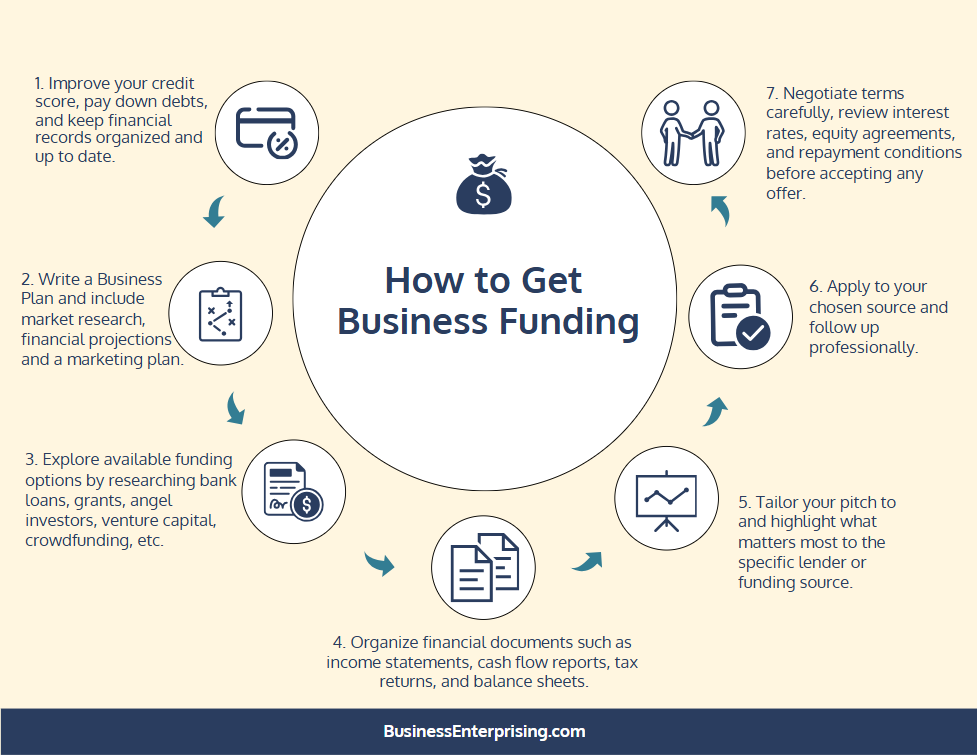 Finding the right approach for how to get business funding can make a major difference in your growth plans. Whether you need capital to launch a new venture or support your next phase of expansion, being prepared is key. Many business owners overlook the steps needed to present a strong funding request.
Finding the right approach for how to get business funding can make a major difference in your growth plans. Whether you need capital to launch a new venture or support your next phase of expansion, being prepared is key. Many business owners overlook the steps needed to present a strong funding request.
Additionally, knowing which funding options are available will help you narrow your search. You might consider traditional loans, government grants, or private investors. Therefore, understanding the pros and cons of each source can help you choose the one that fits your goals.
However, even the best funding source won’t help if your business lacks a strong foundation. Lenders and investors want to see organized financials, clear goals, and realistic projections. They also want to know that your business model works and your team can deliver results.
Therefore, preparation should start long before you send an application or schedule a pitch. You need to understand what funders expect and how to position your business for success. This process includes improving your credit profile, refining your strategy, and gathering the right documentation.
By approaching the funding process with clarity and structure, you create more opportunities for success. Whether you’re starting small or scaling fast, the steps you take now can shape your future. With the right tools and information, you’ll be better equipped to secure the capital your business needs.
Understanding Different Types of Business Funding
Securing appropriate funding is a critical step in launching or expanding your business. Understanding the diverse funding options available can help you make informed decisions tailored to your needs. Here’s an overview of common funding sources:
Personal Funding (Bootstrapping)
Utilizing your own savings or personal assets to finance your business offers complete control and avoids debt. However, this approach limits your resources and places personal finances at risk.
Loans
Traditional bank loans and credit lines provide capital that must be repaid with interest. These require a solid credit history and a convincing business plan. Alternatively, online lenders may offer more flexible terms but often at higher interest rates.
Grants
Various government agencies, private foundations, and corporations offer grants that don’t require repayment. These are highly competitive and typically come with specific usage and reporting requirements.
Angel Investors
Affluent individuals provide capital to startups in exchange for convertible debt or ownership equity. Beyond funding, they often offer mentorship and valuable industry connections. However, securing angel investment involves giving up partial ownership.
Venture Capital
Venture capital firms invest in startups with high growth potential, typically in exchange for equity. They provide substantial funding and strategic guidance but usually seek significant control and a clear exit strategy.
Crowdfunding
Platforms like Kickstarter and Indiegogo allow you to raise small amounts of money from a large number of people. This method not only generates funds but also validates your product or service in the market. Success often depends on a compelling campaign and effective marketing.
Each funding source has its advantages and challenges. Assess your business’s specific needs, stage, and goals to determine the most suitable option. Seeking professional advice can also enhance your understanding of how to get business funding effectively.
Assessing Your Business’s Financial Needs and Stage
Securing appropriate funding is pivotal for your business’s growth and sustainability. Understanding the diverse financing options available can help you make informed decisions. Traditional bank loans offer a common route, providing capital that is repaid over time with interest. However, qualifying for these loans often requires a solid credit history and collateral.
Alternatively, grants provide funds that don’t require repayment, though they are typically competitive and come with specific eligibility criteria. Venture capital involves exchanging equity for substantial investment, suitable if you’re aiming for rapid expansion and are open to sharing ownership. Similarly, angel investors offer capital, often coupled with mentorship, in return for equity, making them valuable partners during early growth stages.
Crowdfunding platforms enable you to present your business idea to a broad audience, securing small investments from numerous backers. This approach not only raises funds but also validates your product or service in the market. Additionally, bootstrapping—using personal savings or reinvesting profits—allows you to maintain full control, though it may limit the speed of your expansion.
Understanding these options is essential when exploring how to get business funding. Each method has its advantages and considerations, so aligning your choice with your business’s needs and goals is important. By carefully evaluating these avenues, you can select a funding strategy that supports your company’s growth trajectory.
Preparing a Strong Business Plan and Financial Projections
Crafting a robust business plan and precise financial projections is essential when learning how to get business funding. These documents not only outline your business’s goals but also demonstrate to potential investors or lenders that you have a clear strategy for achieving them. A well-structured plan serves as a roadmap, guiding your business toward sustainable growth and profitability.
Financial projections, including income statements, balance sheets, and cash flow statements, provide a quantitative glimpse into your business’s future performance. These projections help potential funders assess the viability and stability of your venture. By presenting realistic and data-driven forecasts, you build credibility, showcasing your understanding of market dynamics and operational costs.
Moreover, a comprehensive business plan addresses potential challenges and outlines strategies to overcome them. This proactive approach reassures lenders and investors of your preparedness and commitment. Incorporating detailed financial projections further solidifies your plan, illustrating how you intend to allocate resources and achieve financial milestones.
Developing a thorough business plan accompanied by accurate financial projections significantly enhances your credibility with potential funders. These elements collectively demonstrate your dedication, strategic thinking, and readiness to navigate the complexities of business growth. Understanding how to get business funding becomes more attainable when you present a clear, detailed, and realistic plan to those considering investing in your venture.
Improving Your Business Credit and Financial Profile
Securing financing is a significant step for your business’s growth. A robust credit profile enhances your credibility with lenders and investors. Understanding how to get business funding involves strengthening your business’s financial health. First, establish your business as a distinct legal entity, such as an LLC or corporation. This separation safeguards your personal assets and lays the groundwork for building business credit. Obtaining an Employer Identification Number (EIN) is essential for tax purposes and financial transactions. Next, open a dedicated business bank account to manage your company’s finances effectively. This practice not only streamlines financial operations but also demonstrates professionalism to potential creditors.
Applying for a business credit card and consistently paying off balances on time helps establish a positive credit history. Maintaining low credit utilization, ideally below 30%, further strengthens your credit profile. Registering for a D-U-N-S Number with Dun & Bradstreet is another crucial step. This unique identifier allows your business to be recognized by credit reporting agencies and potential partners. Regularly reviewing your business credit report ensures accuracy and allows you to address any discrepancies promptly. Timely payments to suppliers and creditors are vital, as payment history significantly impacts your credit score. Additionally, cultivating relationships with vendors who report payment histories to credit bureaus can enhance your creditworthiness. Consistent, on-time payments to these vendors contribute positively to your credit profile.
By proactively managing your business’s financial obligations and maintaining transparent records, you position your company favorably for future funding opportunities. A strong credit profile not only facilitates access to capital but also reflects your business’s reliability and financial responsibility.
How and Where to Apply for Funding
Securing funding is a pivotal step in launching or expanding your business. Understanding the various funding sources can significantly enhance your ability to obtain the necessary capital.
Traditional Bank Loans
Traditional bank loans are a common funding avenue, offering structured repayment terms and competitive interest rates. However, they often require a solid credit history and substantial collateral. Establishing a strong relationship with your bank can improve your chances of approval.
SBA-Guaranteed Loans
The U.S. Small Business Administration (SBA) partners with lenders to provide loans with favorable terms for small businesses. These loans can be used for various purposes, including working capital and equipment purchases. The SBA’s involvement reduces lender risk, potentially easing the approval process.
Grants
Grants offer non-repayable funds to support specific business activities. They are typically provided by government agencies, non-profit organizations, and corporations. While highly competitive and often industry-specific, grants can be a valuable resource for eligible businesses.
Venture Capital
Venture capital involves exchanging equity for substantial funding from investors seeking high-growth potential. This option suits businesses poised for rapid expansion and willing to share ownership. Venture capitalists often bring valuable expertise and networks to the table.
Angel Investors
Angel investors are affluent individuals who provide capital to startups in exchange for equity or convertible debt. They often invest during early stages, offering not only funds but also mentorship and industry connections.
Crowdfunding
Crowdfunding platforms enable you to present your business idea to a broad audience, securing small investments from numerous backers. This approach not only raises funds but also validates your concept and builds a customer base.
Bootstrapping
Bootstrapping involves funding your business through personal savings and revenue. While it allows you to maintain full control, it may limit growth potential due to constrained resources. Careful financial management is essential when bootstrapping.
Understanding these funding options is integral to developing a comprehensive strategy for how to get business funding. Evaluating each source’s advantages and requirements will help you determine the best fit for your business’s needs.
Common Mistakes to Avoid When Seeking Funding
Securing funding is a pivotal step for your business’s growth. However, many entrepreneurs encounter obstacles during this process. By understanding common mistakes, you can enhance your funding prospects.
A frequent error is approaching funders without a comprehensive business plan. Lenders and investors seek clear insights into your business model, market analysis, and financial projections. A well-structured plan demonstrates your preparedness and commitment. Without it, securing funding becomes significantly more challenging.
Additionally, misjudging the amount of funding needed can hinder your efforts. Requesting too little may leave you underfunded, while asking for too much can raise concerns about your financial acumen. Carefully assess your financial requirements to present a justified and realistic funding request.
Furthermore, neglecting to explore diverse funding options limits your opportunities. Beyond traditional bank loans, consider alternatives like crowdfunding, angel investors, or government grants. Each source offers distinct advantages tailored to various business needs. Broadening your search increases the likelihood of finding suitable funding.
Moreover, delaying the pursuit of funding can impede your business’s momentum. Waiting until finances are strained may lead to unfavorable terms or missed opportunities. Proactively seeking funding positions your business to capitalize on growth prospects effectively.
By addressing these areas thoughtfully, you can navigate the funding process more effectively. Learning how to get business funding involves strategic planning and proactive engagement.
Online Business Funding Course
Securing funding is a pivotal step in launching or expanding your business. Business Enterprising offers an Online Business Funding Course designed to equip you with the knowledge and skills to navigate this process effectively.
This comprehensive course demystifies the complexities of business financing. You’ll explore various funding avenues, including loans, grants, and investor capital. Additionally, the course provides a downloadable PDF with contacts for funding your business or startup. By understanding these options, you can determine the best fit for your business needs.
Crafting a compelling pitch is essential when seeking financial support. The course guides you in developing pitches that capture attention and clearly communicate your business’s value. You’ll learn to approach different investors, such as angel investors, venture capitalists, and crowdfunding platforms, increasing your chances of securing funding.
Financial literacy plays a significant role in funding success. The course breaks down financial statements and valuation concepts into understandable segments. This knowledge enables you to present your business’s financial health confidently, demonstrating potential returns to prospective investors.
Negotiation is another critical aspect covered in the course. You’ll gain insights into deal structuring and negotiation techniques, helping you balance maintaining control and attracting investment. Furthermore, the course touches on financial planning, budgeting, and cash flow management, ensuring you can manage funds wisely for long-term success.
Alternative funding options, such as government grants and strategic partnerships, are also explored. Understanding these avenues can open new doors for your business’s financial future. By enrolling in this course, you take a proactive step toward mastering how to get business funding and fueling your entrepreneurial aspirations.
Conclusion
Securing the right funding can support your business goals and strengthen long-term growth. However, preparation is essential before seeking capital. By assessing your business needs, improving your credit profile, and selecting the right funding source, you increase your chance of success.
Additionally, organizing your financial records and building a clear business plan shows lenders that you’re serious and reliable. These materials also demonstrate how you plan to use the funds and generate returns. Therefore, clarity and transparency make your funding requests more compelling to investors and institutions.
However, common mistakes like asking for too much or too little can damage your credibility. Presenting a realistic funding amount supported by strong documentation helps avoid that issue. You’ll also want to understand how funding terms affect your long-term obligations and cash flow.
Furthermore, your business’s stage and industry can shape your best funding options. A startup may benefit from angel investors or grants. Meanwhile, an established business might be better suited for loans or venture capital. Therefore, align your funding strategy with your current phase and growth goals.
Knowing how to get business funding is not just about filling out applications. It’s about preparation, timing, and understanding what each funder wants. By approaching the process with insight and organization, you improve your chances of finding the right partner to support your business vision.



